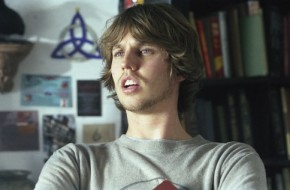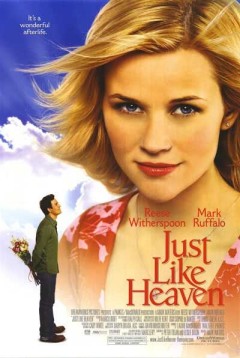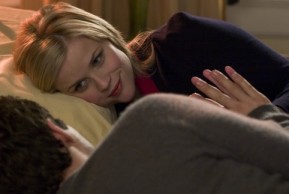|
Just
Like Heaven
Just Like Heaven lives up to every possible expectation
offered up by its trailer. That is, of course, if said expectations
consist of wasted talent, predictable ho-hum wrap-ups laced
with inexplicably convenient chance resolutions, and interesting
possibilities squandered by last minute retractions into
the safely clichéd. Yep, Just Like Heaven
has that payload in spades.
You
see, the problem with a film like this isn’t the fact
that we know as an audience that there must be more to Ellizabeth
Masterson’s (Reese Witherspoon) dilemma, or that David
Abbott (Mark Ruffalo) will have something to do with uncovering
her secret and helping resolve her woes in the end. No,
these are pretty much welcomed expectations in a film of
this stature, and had director Mark Waters strayed from
these conventions he would have had droves of filmgoers
cursing his name on the way out the door.
Of course,
at least then they would know who he was, so perhaps that
wouldn’t be entirely bad. There is, after all, a price
for fame.
No,
the problem here is that the film seems far more ripe with
opportunity than it actually is, and in the end, certain
turns feel forced merely for the sake of aligning with the
clichéd expectations of the genre. It didn’t
have to be this way, but it is. The result is, most savvy
filmgoers will go into cruise control mode forty-five minutes
into the film, and merely tune out for the resulting decline
into the closing credits.
The
premise is simple enough. Elizabeth is a young accomplished
doctor eagerly overworking herself in hopes of further professional
success. She’s lonely and seems to wish to meet someone,
but work comes first and foremost. We meet her on a busy
night, finishing up a twenty-three hour shift at the hospital,
and running late for dinner at her sister Abby’s (Dina
Waters) house. Abby is playing matchmaker and hopes to set
Elizabeth up with an acquaintance of hers over lasagna that
includes a Spongebob Squarepants doll baked into it by accident.
All
of this is cut short when, inexplicably, Elizabeth is run
into headfirst by an oncoming truck. No reasoning whatsoever.
The truck wasn’t swerving to avoid a hazard, and Elizabeth
didn’t accidentally turn down a one way street. All
we need know is something bad happened. ‘Nuff said.
Enter
David Abbott, a man eagerly seeking a place to live in San
Francisco. We tag along as he visits various different furnished
apartments and houses, where he proceeds to rate each one
based on the comfort of their individual couches. The man
has a plan, and when fate steps in bringing him to an apartment
being rented on a month to month basis, David finds the
couch he’d been searching for.
His
plan, it seems, is to spend his days glued to the couch
in front of the television, sucking down beers while watching
his wedding video on repeat. Many of these opening sequences
play for bittersweet laughs, tiny moments that tell snippets
of what these characters are comprised of, glimpses of who
they may long to become, and allows peeks into what seems
to be haunting them in their own quiet ways.
In two
words: it works.
When
Elizabeth suddenly appears in David’s apartment, we
are given ample reasons to believe that he may, in fact,
be drunk and therefore merely seeing things. He makes this
leap as well, but upon further visitations begins to question
his own sanity.
In steps
Jack (Donal Logue), David’s closest friend, confidant,
and as we learn, is kind enough to serve as David’s
psychologist without charging him per session. The chemistry
and charm Logue brings to his characters is always a welcomed
presence, and this case is no different. Ruffalo and Logue
share some excellent screentime together, dancing around
David’s loneliness and the woman he is currently “seeing.”
As David
continues to try to understand why Elizabeth continues to
visit him, bossing him about cleanliness and going on and
on about how he is squatting in her apartment, he makes
the prerequisite pit stop at the local supernatural bookstore
for some friendly advice. There he encounters Darryl (Jon
Heder), a man with the penchant for recognizing the presence
of spirits and reading what their intentions may be for
those around them.
 |
Having
a ham like Heder, a foil like Logue, and a leading man like
Ruffalo seems to be the recipe for something decent, but
it isn’t. What we end up with is a few scenes that
prove endearing, and the rest is pretty much by the book.
It’s established early on that Elizabeth has no time
for personal endeavors outside of work, so guess what will
be a piece of the puzzle in helping Elizabeth solve her
issues? Ruffalo’s sad-sack state has to factor in
at some point, and when it finally does, the scene is tempered
with groan inducing saccharine filled sentimentality enough
to send anyone into a sugar rush.
In the
end, there are a few things to note. Witherspoon could have
been worse, although she will never top her turn in Election,
no matter how hard she may try. When Logue’s Darryl
returns in the third act, there are a few laughs worth noting,
including an interestingly hilarious connection tying David,
Elizabeth, Abby, and Darryl together. All of this is enough
to warrant a yuck or two, but this film is hardly romantic
enough to justify its routinely tired disposition. All of
this is shameful in a sense because the novel that Just
Like Heaven was adapted from, Marc Levy’s If
It Were Only True, is supposedly pretty good, which
is more than can be said for the film.
Rating:

|








